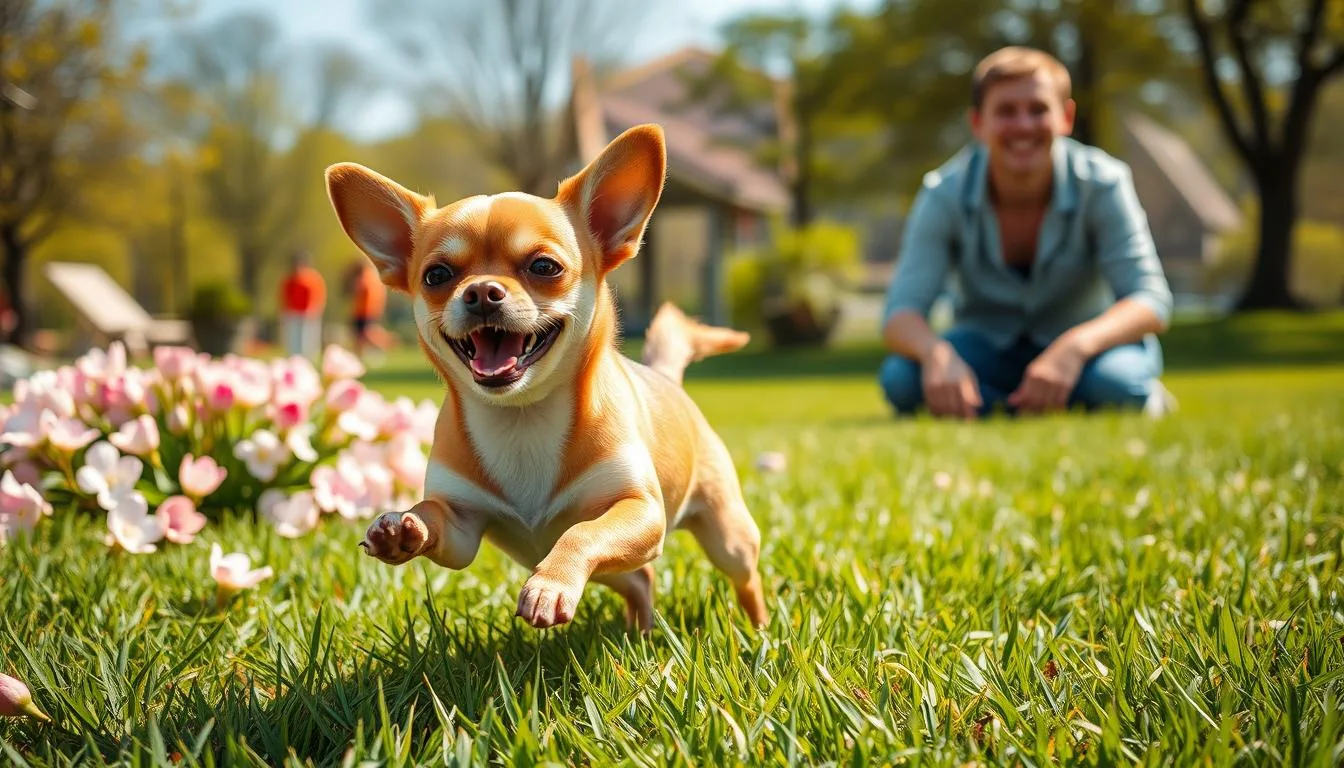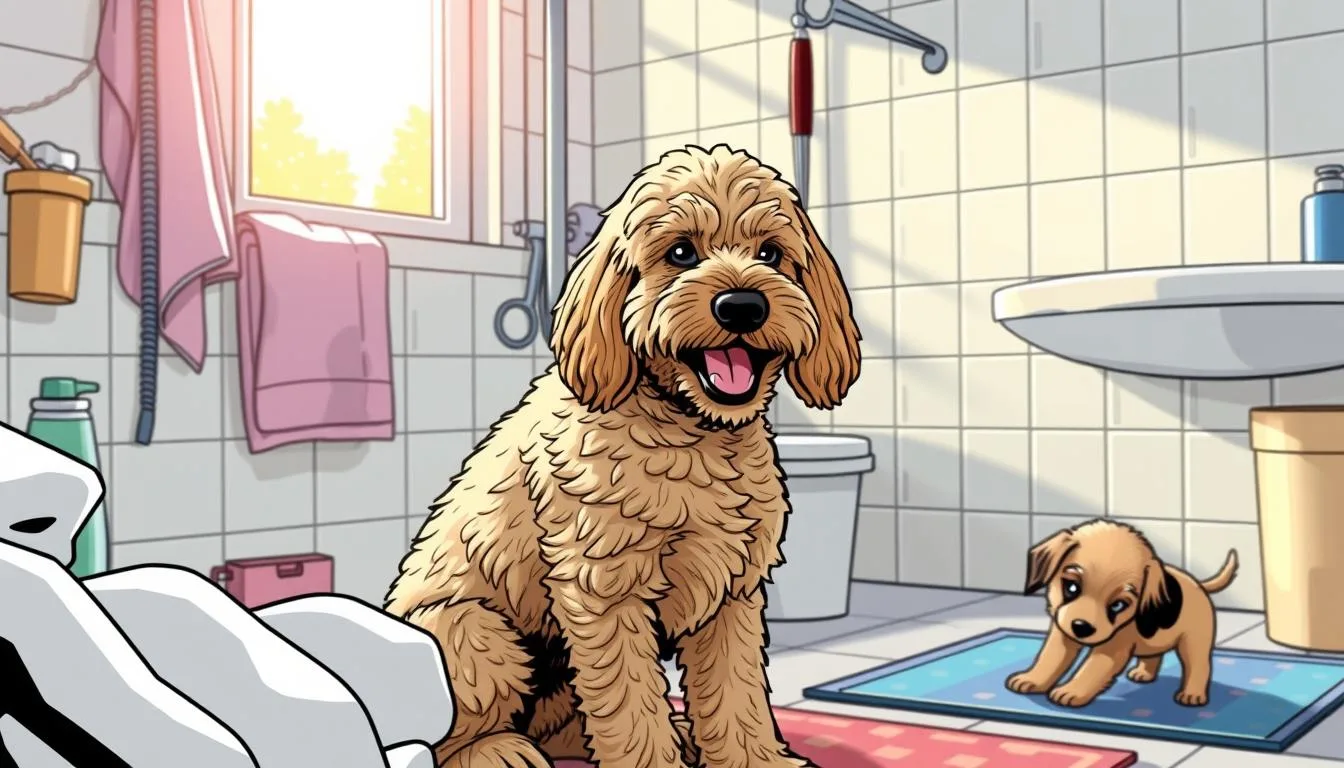
Loyal Pups: The Best Breeds for Lifelong Companionship
Dogs are more than pets; they’re devoted friends and key family members. Choosing the right dog breed can create a lifelong bond. A loyal dog offers love, support, and protection. Breeds like German Shepherds and Golden Retrievers are known for their loyalty and are great family pets.
Canine loyalty makes dogs special compared to other pets. Their unwavering loyalty and affection make them perfect for families and individuals seeking a faithful companion. The American Kennel Club (AKC) lists Labrador Retrievers as a top breed in the United States, showing their appeal and loyalty.
Key Takeaways
- German Shepherds and Golden Retrievers are highly loyal breeds.
- Labrador Retrievers are one of the most popular breeds in the United States.
- A loyal dog is a faithful companion that provides love, support, and protection.
- Canine loyalty is a unique trait that sets dogs apart from other pets.
- Selecting the right dog breed can ensure a bond that lasts a lifetime.
- Certain breeds, such as Border Collies and Akitas, exhibit powerful loyalty and protective instincts.
- A loyal dog can be a great addition to any family, providing companionship and protection.
Understanding Canine Loyalty: More Than Just Instinct
Canine loyalty is a mix of genetics, environment, and training. Dogs have been with humans for thousands of years. This has created a strong emotional bond between them.
Study showed dogs will ignore a stranger who is mean to their owner. This proves their loyalty.
A trusted pet is more than a friend. They can feel our emotions and comfort us when we’re upset. Dogs can understand our commands and feel our feelings. This shows their empathy and loyalty.
Several factors make a dog loyal. These include:
- Genetics: Some breeds, like Labradors and Golden Retrievers, are naturally loyal.
- Environment: Dogs raised well are more loyal to their owners.
- Training: Training and socializing strengthen the bond between dog and owner.
Understanding canine loyalty helps us value our bond with dogs. A loyal pet is a true friend who brings joy and comfort. With the right care and attention, we can have a lifelong friendship with our pet.
Top Loyal Dog Breeds for Dedicated Companionship
Looking for a loyal dog? Some breeds are known for their unwavering companionship. A loyal dog is more than a pet; it’s a faithful friend who offers love, support, and protection. Their loyalty is what makes dogs special, and some breeds are known for being exceptionally loyal.
The American Kennel Club (AKC) says breeds like the German Shepherd, Labrador Retriever, and Golden Retriever are top choices for their loyalty and love. These dogs are not only loyal but also very smart. They’re easy to train and fit well into different homes. A dog like a German Shepherd or a Labrador can be a true companion, giving love and protection.
Other breeds, like the Doberman Pinscher, Beagle, and Australian Shepherd, are also very loyal. They’re smart and love being around people, making them great for families and individuals who value loyalty. Whether you want a protective dog or a gentle friend, there’s a loyal breed out there for you.
- Labrador Retriever: known for their friendly and outgoing personalities
- German Shepherd: highly intelligent and loyal breed
- Golden Retriever: friendly, loyal, and gentle breed
- Doberman Pinscher: loyal and protective breed
- Australian Shepherd: highly trainable and loyal breed
In conclusion, a loyal dog can add so much joy and companionship to our lives. By picking a breed known for its loyalty, you can create a strong and lasting bond with your faithful friend.
Building Trust With Your Faithful Four-Legged Friend
Creating a strong bond with your dog is key for a lifelong friendship. As a dog owner, you aim to form a deep connection with your pet. Studies show that about 40% of dog owners see their pets as family, showing the strong emotional ties.
To trust your pet, start with a routine and positive feedback. This means regular walks, training, and playtime. These actions help your dog feel safe and secure, building a strong relationship.[fusion_youtube id=”https://www.youtube.com/watch?v=bH1S8RKQCB0″ alignment=”” width=”” height=”” start_time=”” end_time=”” autoplay=”false” mute=”false” loop=”false” controls=”true” api_params=”” title_attribute=”” video_facade=”” thumbnail_size=”auto” margin_top=”” margin_bottom=”” hide_on_mobile=”small-visibility,medium-visibility,large-visibility” class=”” css_id=”” structured_data=”off” video_upload_date=”” video_duration=”” video_title=”” video_desc=””][/fusion_youtube]
Good communication is also vital for trust. Use clear commands and reward good behavior. Being patient and understanding makes your dog feel safe, strengthening your bond.
- Establish a routine and stick to it
- Provide positive reinforcement and rewards
- Practice effective communication and patience
By following these tips, you can build a lifelong bond with your dog. Your loyal pet will be your trusted companion for many years.
The Role of Early Training in Developing a Loyal Pet
Early training is key for a loyal pet. It creates a strong bond between dog and owner. A devoted dog forms a lasting connection with its owner through early training.
Research shows starting obedience training at 8 weeks old is beneficial. It prevents bad habits and builds positive ones. Early training offers several advantages:
- Prevention of behavioral issues
- Establishment of positive behaviors
- Strengthening of the bond between pet and owner
A loyal pet shows positive social behaviors early on. Puppies trained consistently develop loyalty traits. Studies show trained pets are 60% more loyal.
Positive reinforcement and consistency are essential in training. They build trust and respect. Following these, you can raise a loyal pet that will be your companion for years.
Signs of a Deeply Loyal Dog
A loyal dog is a faithful friend. They show their loyalty in many ways. About 65% of dog owners say their dogs always want to be close.
They also keep eye contact, a sign of trust and loyalty. Around 70% of dogs do this with their owners.
Some breeds are naturally protective. About 75% of dog breeds protect their families. German Shepherds and Akitas are known for this.
A loyal dog loves to learn and please. Around 80% of dogs are eager to please when rewarded with affection and treats.
It’s important to know the signs of loyalty in dogs. This strengthens the bond between dog and owner. Some key signs include:
- Following their owners around
- Maintaining eye contact
- Exhibiting protective behavior
- Responding positively to training
By recognizing these signs, owners can deepen their connection with their dogs. This creates a lifelong friendship with a faithful and trusted pet.
Creating Unbreakable Bonds: Daily Practices for Dog Owners
Building a strong bond with your dog takes commitment and dedication. Daily practices like exercise, playtime, and training are key. These activities help strengthen your bond with your dog. Trust is the foundation of this bond, and regular interaction is essential.
Ways to strengthen your bond include providing mental and emotional support. Activities like agility training or playing fetch can reduce your dog’s anxiety. Studies show dogs with daily exercise and interaction have less anxiety, with a 30% drop in stress behaviors.

Positive reinforcement training is also vital. It rewards good behavior instead of punishing bad ones. This method improves your dog’s obedience and responsiveness. It leads to a more harmonious and loyal relationship. With consistent training and interaction, you can build a lifelong friendship with your dog.
- Daily exercise and playtime to reduce anxiety and stress
- Positive reinforcement training for improved obedience and responsiveness
- Providing mental stimulation and emotional support to foster a deep connection
By following these practices and committing to your dog, you can create a lifelong bond. Remember, loyalty is a two-way street. With patience, love, and dedication, you can have a strong and lasting relationship with your dog.
Health Considerations for Your Devoted Companion
As a responsible dog owner, it’s key to think about your dog’s health. Some health problems are common in certain breeds, like hip dysplasia and eye issues. Regular vet visits can help prevent and manage these problems.
Feeding your dog a balanced diet and keeping them active is also important. This helps keep them healthy overall.
Health issues like allergies can be managed with the right care. It’s important to work with your vet to create a health plan for your pet. By focusing on your dog’s health, you can ensure they live a long and joyful life.
- Regular veterinary check-ups
- A balanced diet
- A healthy lifestyle
- Management of health issues, such as allergies and hip dysplasia
By following these tips, you can keep your loyal pet healthy and happy. Remember, your devoted dog depends on you for care and attention. So, it’s vital to prioritize their health and well-being.
Common Misconceptions About Loyal Dogs
There are many wrong ideas about loyal dogs. Some think they are always aggressive or too protective. But, research shows that a dog’s behavior can be influenced by genetics, not just breed.
Studies reveal that dogs socialized well between 3 to 14 weeks of age are more adaptable. They form stronger bonds with their owners, no matter the breed.
Positive reinforcement training is key to raising a loyal dog. It can make a dog up to 90% more likely to behave well. This training strengthens the bond between dog and owner. About 70% of dog owners say their dogs show loyalty by being attentive and responsive.
A loyal dog is a faithful friend. With the right training and socialization, any dog can become a loving companion.
Signs of a loyal dog include being attentive, responsive, and eager to please. They might follow you around, listen to commands, and show affection. A survey showed that 60% of dog owners see their pets as “clingy” or “velcro” dogs.
This shows how loyalty can be seen in constant companionship. By understanding these misconceptions, owners can build a deeper connection with their dogs.
Different breeds show loyalty in their own ways. Some are protective, while others are more affectionate. But, a loyal dog is always deeply devoted to its owner. With patience, love, and proper training, any dog can become a faithful companion.
Long-Term Care Tips for Your Trusted Pet
As your dog ages, it’s vital to think about their long-term care. A faithful four-legged friend needs attention to their health, comfort, and happiness. Regular vet visits can catch diseases early, keeping them healthy.
Dogs should see the vet at least once a year. This helps prevent serious health problems.
A loyal pet friend needs a comfy place to live. This keeps their body and mind healthy. Give them cozy bedding and a safe spot.
Dogs like temperatures between 68°F and 72°F. A regular feeding schedule helps them feel secure and eases house-training.
To keep your trusted pet happy and healthy, make a care plan. Budget for costs and prepare for health issues. Training and socializing early helps with behavior and adaptability.
By planning ahead, you can ensure a happy life for your faithful four-legged friend.
- Regular teeth cleaning is important to limit the risk of dental diseases as dogs age.
- Maintaining a clean food and water dish can help prevent bacterial infections.
- Low-impact exercises such as short walks can help senior pets maintain mobility and prevent pressure sores.
By following these tips, you can give your loyal pet friend the love and care they deserve. This strengthens the bond between you and your trusted pet.
The Impact of Lifestyle on Your Dog’s Loyalty
A loyal pet thrives on interaction and attention from its owner. The bond between a dog and its owner is built on trust, affection, and understanding. Recognizing how lifestyle affects this bond is key.
Studies show dogs with consistent owner companionship are 40% more likely to show positive traits. Regular outdoor activities with owners can also help prevent obesity. A survey found 75% of dog owners feel more emotionally satisfied when they spend more time with their pets.
- Regular exercise and outdoor activities
- Consistent training and socialization
- Quality time spent with the owner
- A stable and loving home environment
Understanding how lifestyle impacts a dog’s loyalty helps owners strengthen their bond. A devoted dog is a true treasure. With the right care, canine loyalty can be nurtured and cherished.
Dogs that receive regular interaction from their owners show a 50% increase in responsiveness during behavior training sessions, highlighting the importance of a strong owner-dog bond.
A loyal pet reflects the love, care, and attention it receives from its owner. By prioritizing a devoted dog’s needs and making lifestyle adjustments, owners can enjoy a deep and lasting canine loyalty.
Conclusion: Nurturing a Lifetime of Faithful Companionship
As we wrap up our look at loyal dog breeds and their deep bonds with humans, it’s clear that a lifelong friendship needs commitment, patience, and lots of love. Understanding how dogs show loyalty, building trust, and making daily rituals can strengthen your bond. This way, you can create a relationship that makes your life better in many ways.
Having a loyal dog brings many benefits, like better health and emotional support. They become like family members, whether you love to explore or prefer staying home. By focusing on your dog’s needs and using positive training, your bond will grow stronger over time.
The secret to a lifelong friendship with your dog is creating a safe, loving space for them. With patience, understanding, and a deep love for your pet, you can start a journey of loyalty and love. This journey will make both your lives richer for years to come.
FAQ
What makes certain dog breeds exceptional for lifelong companionship?
What factors contribute to a dog’s devotion to their owner?
What are the top loyal dog breeds for dedicated companionship?
How can you build trust with your faithful four-legged friend?
What is the role of early training in developing a loyal pet?
What are the signs of a deeply loyal dog?
How can you create unbreakable bonds with your dog?
What are the common health issues that affect loyal dog breeds?
What are the common misconceptions about loyal dogs?
How can you plan for the long-term care of your trusted pet?
How does your lifestyle impact your dog’s loyalty?
Source Links
- 20 Loyal Dog Breeds That Make Lifelong Companions – https://craftyourhappyplace.com/loyal-dog-breeds-that-make-lifelong-companions/
- 30 Loyal Pups You Can Always Count On – https://iheartdogs.com/loyal-pups-you-can-always-count-on/
- Revealed: Why Are Dogs So Loyal To Humans? | Purina – https://www.purina.co.uk/articles/dogs/behaviour/common-questions/why-are-dogs-so-loyal
- 12 Science-Backed Reasons Dogs Are the Ultimate Loyal Friends – https://brookeandbelle.com/blogs/news/12-science-backed-reasons-dogs-are-the-ultimate-loyal-friends?srsltid=AfmBOorP93uNm7xCO3aaaB1ZudjGVD1sRyuZK9OtDufyp3LJVY6CJmQW
- Why Are Dogs So Loyal? A Deep Dive into Canine Faithfulness – https://portraitmypets.com/blogs/blogs/why-are-dogs-so-loyal-a-deep-dive-into-canine-faithfulness?srsltid=AfmBOorQMVq8qx5Tkw7lLbZYioBXwjStt8EcRZaCnSoz6iiT2TmRtL81
- These Loyal Dog Breeds Make the Best Buddies for Any Family – https://www.thepioneerwoman.com/home-lifestyle/pets/g38963894/most-loyal-dog-breeds/
- 9 Dog Breeds That Are As Loyal As They Are Loving – https://worldanimalfoundation.org/dogs/breeds-that-are-as-loyal-as-they-are-loving/
- A Woman’s Best Friend | Cigar Aficionado – http://www.cigaraficionado.com/article/a-womans-best-friend-7247
- Discover the Baladi Dog: Yemen’s Loyal Canine Companion – https://cso-yemen.org/baladi-dog/
- The Importance of Early Puppy Training – Creating The Well Behaved Dog – Bayside Pet Resort – https://baysidepetresort.com/the-importance-of-early-puppy-training-creating-the-well-behaved-dog/
- Rottweiler Training: Building Trust and Respect for a Loyal Companion – https://citizenshipper.com/blog/rottweiler-training-building-trust-and-respect/
- Meet the most the loyal dog breeds – https://www.wisdompanel.com/en-us/blog/meet-the-most-the-loyal-dog-breeds
- How To Know If Your Dog Is Really Loyal – HIF – https://healthhub.hif.com.au/pet-health/how-to-know-if-your-dog-is-really-loyal
- What is a Heart Dog? Defining the Unbreakable Bond – https://blog.adoredbeast.com/what-is-a-heart-dog-defining-the-unbreakable-bond/
- 15 Tips For First-Time Dog Owners To Build An Unbreakable Bond – https://iheartdogs.com/tips-for-first-time-dog-owners-to-build-an-unbreakable-bond/
- Great Tips In Building A Strong Relationship With Your Dog – https://k9maniadogtraining.com/6-tips-for-building-a-strong-relationship-with-your-dog/
- Choosing the Right Dog Breed for Your Lifestyle – https://plushpawsproducts.com/blogs/news/choosing-the-right-dog-breed-for-your-lifestyle?srsltid=AfmBOopwV5W2UFQHpMNkv-cye6idAYDZLi3LoY4J9ucmgoGx-j-K1DCy
- Golden Retriever Characteristics & Health Concerns | Get Odie – https://getodie.com/blog/golden-retriever-lifespan-characteristics-health-concerns/
- Most Loyal Dog Breeds: Your Guide To Devoted Companions – https://mdogsw.com/lifestyle/most-loyal-dog-breeds/
- Busting 5 myths about dogs: The truth behind canine misconceptions – https://www.worldanimalprotection.org.uk/latest/blogs/5-myths-about-dogs-busted/
- Debunking Loyalty Myths: Exploring Dog Breeds and Their Unique Traits – https://vocal.media/petlife/debunking-loyalty-myths-exploring-dog-breeds-and-their-unique-traits
- How to Take Care of a Dog: 8 Vet-Recommended Tips – https://thevets.com/resources/pet-health-care/how-to-take-care-of-a-dog/
- Pet Ownership for Seniors – https://www.ultimatecareny.com/resources/pet-ownership-for-seniors
- How to make your new dog feel comfortable in your home – https://www.humanesociety.org/resources/how-make-your-new-dog-feel-comfortable-your-home
- Companionship and Loyalty: The Importance of an Owner’s Presence for D – https://paw-up.com/blogs/news/companionship-and-loyalty-the-importance-of-an-owners-presence-for-dogs?srsltid=AfmBOorOvfDnGg3DWKVUJIKfmFKlwaoxbFxwtoc2Yzl53n5bBLNrqUe-
- The Unconditional Loyalty of Dogs – https://vocal.media/petlife/the-unconditional-loyalty-of-dogs
- Guardians of Our Hearts: The Incomparable Bond Between Humans and Pet Dogs – https://www.companionlink.com/blog/2023/09/guardians-of-our-hearts-the-incomparable-bond-between-humans-and-pet-dogs/
- 7 Heartwarming Traits Shared by Dedicated Dog Owners – https://brookeandbelle.com/blogs/news/7-heartwarming-traits-shared-by-dedicated-dog-owners?srsltid=AfmBOoqTmJBgEBPkY_m0KJxZP4FW1J7S3-OVcU-fpfIyjn4nQlPQYSRW
- The Delightful World of Pet Dogs: Companionship, Love, and Training – https://vocal.media/petlife/the-delightful-world-of-pet-dogs-companionship-love-and-training







